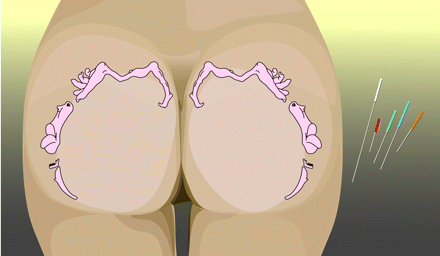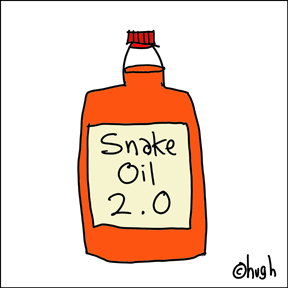August 7th, 2011 by David H. Gorski, M.D., Ph.D. in Opinion, Research
No Comments »

Ever since I was a teenager, I’ve intermittently read Consumer Reports, relying on it for guidance in all manner of purchase decisions. CR has been known for rigorous testing of all manner of consumer products and the rating of various services, arriving at its rankings through a systematic testing method that, while not necessarily bulletproof, has been far more organized and consistent than most other ranking systems. True, I haven’t always agreed with CR’s rankings of products and services about which I know a lot, but at the very least CR has often made me think about how much of my assessments are based on objective measures and how much on subjective measures.
Until now.
I just saw something yesterday on the CR website that has made me wonder just how scientific CR’s testing methods are, as CR has apparently decided to promote alternative medicine modalities by “assessing” them in an utterly scientifically ignorant manner. Maybe I just haven’t been following CR regularly for a while, but if there’s an article that demonstrates exactly why consumer product testing organizations should not be testing medical treatments; they are ill-equipped to do so and lack the expertise and knowledge. The first red flag was the title, namely Hands-on, mind-body therapies beat supplements. The second red flag was the introduction to the article: Read more »
*This blog post was originally published at Science-Based Medicine*
December 16th, 2010 by Harriet Hall, M.D. in Better Health Network, Humor, Medical Art, Opinion, Research
No Comments »

In 1996, Alan Sokal got a bogus paper published in the journal Social Text. It was a parody full of meaningless statements in the jargon of postmodern philosophy and cultural studies. The editors couldn’t tell the difference between Sokal’s nonsense and the usual articles they publish.
Now a British professor of medical education, Dr. John McLachlan, has perpetrated a similar hoax on supporters of so-called “integrative” medicine. He reports his prank in an article in the British Medical Journal (BMJ).

After receiving an invitation to submit papers to an International Conference on Integrative Medicine, he invented a ridiculous story about a new form of reflexology and acupuncture with points represented by a homunculus map on the buttocks. He claimed to have done studies showing that
responses are stronger and of more therapeutic value than those of auricular or conventional reflexology. In some cases, the map can be used for diagnostic purposes.
The organizers asked him to submit an abstract. He did. In the abstract he said he would present only case histories, testimonies, and positive outcomes, since his methods did not lend themselves to randomized controlled trials; and he suggested that his “novel paradigm” might lead to automatic rejection by closed minds. Read more »
*This blog post was originally published at Science-Based Medicine*
November 30th, 2009 by Dr. Val Jones in Announcements, Health Policy, Quackery Exposed
No Comments »
 I’ve been warning folks about this for years – and alas, fake medicine and quackery has finally oiled its way into the healthcare reform bills. We are in the midst of a growing primary care shortage, and on the brink of vastly expanding health insurance coverage without increasing the supply of physicians and nurses. How will our country solve the supply/demand mismatch? Potentially by allowing people without appropriate training in science and medicine to become your “medical home.” That’s right – your next doctor or nurse may be someone with an online degree in snake oil salesmanship.
I’ve been warning folks about this for years – and alas, fake medicine and quackery has finally oiled its way into the healthcare reform bills. We are in the midst of a growing primary care shortage, and on the brink of vastly expanding health insurance coverage without increasing the supply of physicians and nurses. How will our country solve the supply/demand mismatch? Potentially by allowing people without appropriate training in science and medicine to become your “medical home.” That’s right – your next doctor or nurse may be someone with an online degree in snake oil salesmanship.
I know it’s hard to believe… But please read this press release (reproduced below) for more information – and call your Senator to complain. Maybe we’ll be able to get these sections removed before a bill passes? Read more »
March 7th, 2009 by Dr. Val Jones in Medblogger Shout Outs, Quackery Exposed
2 Comments »
Dean Ornish writes:
…let’s use science to evaluate ideas that might seem a little weird or offbeat, but deciding a priori that an idea is stupid or worthless just because it doesn’t fit the conventional paradigm is, in my humble opinion, the epitome of being unscientific.
Dr. Benway responds:
There’s weird and then there is weird.
Diet and excercise affecting cancer? Plausible.
Naturopathy? Weird.
Subluxations? Homeopathy? Delusional.
MDs selling self-branded supplements? Embarrassing.
Chelation and coffee enemas for kids with autism? Evil.
I believe you are the plausible wrapping paper surrounding a coalition of crazy, weird, embarrasing, and evil ideas that some want to “integrate” into the universal health care bill.
March 2nd, 2009 by Dr. Val Jones in Health Policy, Opinion, Quackery Exposed
4 Comments »
I’ve been blogging a lot recently about the problems caused by health policy makers who don’t appear to understand medicine or science. I’ve also been lamenting the relative lack of physician input at the highest level of health reform. But today I’d like to present a prime example of the perfect storm in health policy: when willfulness, ignorance, and magical thinking combine to push an agenda despite billions of tax payer research dollars proving the futility of such efforts.
In this video, Senator Tom Harkin describes the impetus behind the creation of the National Center for Complementary and Alternative Medicine (NCCAM). Harkin suggests that he single-handedly introduced legislation in 1992 that created the Office of Alternative Medicine at the National Institutes of Health (NIH). This office paved the way for an entire new branch of research at NIH devoted to exploring the potential validity of non-science based medical practices such as homeopathy, acupuncture, traditional Chinese medicine, energy healing, meditation and more. He introduced the legislation because a friend of his experienced a substantial health improvement after trying one of these non-science based therapies. Essentially, an entire branch of the NIH was founded on an anecdote.
What’s worse is that after a decade of careful analysis of these alternative therapies, science has shown that not a single one of them appears to be efficacious beyond placebo. One would think that Senator Harkin would be embarrassed by the colossal waste of tax payer resources spent on this pet project of his. But no, instead he chastises the scientists who did the research, saying that they had failed to do their job of “validating” the therapeutic modalities. Wow. I guess he was never interested in finding out the truth about what works and what doesn’t – because when objective analysis reveals that these modalities don’t work, then the science must be flawed.
Now don’t get me wrong – healthy eating, regular exercise, emotional and psychological support are critical factors in good healthcare, and I fully believe that America needs to become a “wellness culture” in order to prevent chronic diseases and improve quality of life. I also believe that Americans are often over-treated and over-medicated when lifestyle interventions might be their best treatment option. However, in encouraging behavior modifications, we don’t need to foist placebo therapies on them under the banner of science. The problem with “integrative medicine” is that it takes some good medical principles and infuses them with scientifically debunked and outdated systems of thought (debunked repeatedly by NCCAM, the very scientific body that Harkin hoped would validate them.)
What we really need to do is stop splitting the practice of medicine into “integrative” vs “non-integrative” and simply follow scientifically vetted best practices. Patients need a comprehensive approach to their health, a medical home with a good primary care physician coordinating their care, reliable health information to support their decision-making, a strategy to eat well and exercise regularly, and mental health services as needed.
Senator Harkins’ plan to continue flogging the alternative medicine “dead horse” is not helpful – it’s not good science, and it’s not a good way to spend our tax dollars. I can only hope that one of the positive effects of Comparative Clinical Effectiveness Research will be to put an end to the promotion of the ineffective therapies that Harkin fervently hoped would be validated. I also hope that the new Federal Coordinating Council will not support funding to pet projects that are founded upon anecdotes, pseudoscience, and wishful thinking. Now more than ever we need good science underpinning our healthcare spending, and we need informed scientists advising our government on priorities for America’s health.
###
Addendum:
More outrage from the medical blogosphere over Harkin’s views:
1. Dr. David Gorski: Senator Tom Harkin: “Disappointed” that NCCAM hasn’t “validated” more CAM
2. Dr. Peter Lipson: Harkin’s War On Science













